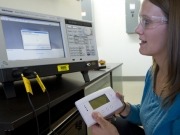
The release of the report coincides with ceremonies in Seoul and Daegu marking one year to go until the 2013 World Energy Congress. The festivities have included a dinner in Seoul with the Ministry of Knowledge Economy, senior officials, foreign ambassadors, and energy CEOs, and an international symposium in Daegu Friday on the theme, “Choosing the Right Way for the Development of Asia’s Energy Industry”.
According to the WEC study, “Smart Grids: Best Practice Fundamentals for a Modern Energy System,” the smart grid test-bed on Korea’s Jeju Island has taken a pioneering approach to overcoming the barriers to developing smart grids.
The report finds that the ongoing Jeju Island project is exemplary thanks to the favourable policy and financing frameworks that pool together the resources and collective thinking of both private companies and the public sector. The project, set to be the world’s largest, will cover the energy needs of 6,000 homes and will provide the foundation for the commercialisation and industrial export of the country’s smart grid know-how. The WEC report also covers other best practice examples, in India, Japan, China, Brazil, Europe, and the USA.
By identifying the key issues and drivers for smart grid implementation, the World Energy Council aims to help facilitate the deployment of smart grids, which can help countries balance the three dimensions of the energy trilemma: how to deliver secure, affordable, and environmentally sound energy. These issues will be amongst those discussed at the World Energy Congress, where senior energy policy and business leaders from around the world will gather to find ways towards solving the energy trilemma.
“The World Energy Congress is a triennial event that provides a global platform for governments, businesses and experts to debate the key energy issues” said Joong-Kyum Kim, Chair of the WEC Daegu 2013 Organising Committee. “It is significant that it is being held in Korea. Not only is the country at an exciting stage in its energy development as it seeks to increase its reliance on nuclear power, LNG and sustainable energy sources, but it is also located in the world’s most dynamic energy region. Asia is in fact the fastest growing market for energy and the convergence point for much of the world’s debate on energy use.”
Pierre Gadonneix, Chairman of the World Energy Council, commented: “Our 2013 World Energy Congress in Daegu, to take place as world leaders deliberate over the successor to the Millennium Development Goals post-2015, will offer a timely opportunity to focus on the energy trilemma and to measure the world’s progress towards a more sustainable energy future. The Congress will build on the World Energy Council’s insights and studies on energy resources and technologies, policies, and scenarios.”
He went on to add: “Our smart grids report provides key examples of best practice to assist policymakers and business to implement this new and vital technology. This will be amongst the pragmatic issues discussed at the World Energy Congress and I look forward to the stimulating debate in a country as vibrant and entrepreneurial as South Korea.”
Further information:
The full report is available at: World Energy Council Publications

